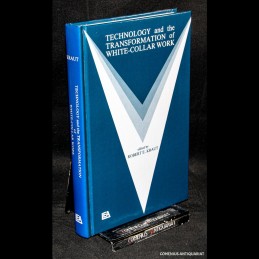Kraut, Robert E. [ed.],
Technology and the Transformation of White-Collar Work. London: LAWRENCE ERLBAUM ASSOC, 1987. x, 281 Seiten mit Literaturverzeichnis und Register. Pappband (gebunden). Grossoktav. 235 x 158 mm. 654 g
Bestell-Nr.158354 | ISBN: 0-89859-633-5 | 978-0-89859-633-5
Kraut |
Soziologie |
Oekonomie |
Psychologie |
Betriebswirtschaft |
Management |
Erwerbstaetigkeit |
Arbeitswelt |
The introduction of new technology and communication to businesses is forever altering the roles and responsibilities of the white- collar workers. This unique collection from authors in such diverse disciplines as psychology, computer science, sociology, history, communication, and public policy, discusses the ways in which these changes have and are effecting the workplace and the employees while speculating on future changes and effects.
Of special significance are the methods suggested for introducing information technology into the workplace. These new methods will increase the quality and quantity of goods and services produced while increasing the quality of working life for employees.
Contents: Part I:Social Impact of White Collar Technology. R.E. Kraut, Social Issues and White-Collar Technology: An Overview. D. Chamot, Electronic Work and the White Collar Employee. P. Murolo, White Collar Woman and the Rationalization of Clerical Work. S. Iacono, R. Kling, Changing Office Technologies and Transformations of Clerical Work. R.L. Feldberg, E.N. Glenn, Technology and the Transformation of Clerical Work. R. Kraft, Computers and the Automation of Work. R. Kraut, Predicting the Use of Technology: The Case of Telework. M.H. Olson, Telework: Practical Experience and Future Prospects. Part II:Implementing Technology in the Office. T. Bikson, Understanding the Implementation of Office Automation. J.H. Bair, User Needs for Office Systems Solutions. J.L. Blomberg, Social Interaction and Office Communication: Effects of User Evaluations on New Technologies. J.C. Taylor, Job Design and Quality of Working Life. N. Bjorn-Andersen, D. Kjaergaard, Choices En Route to the Office of Tomorrow.






 frais de transport
frais de transport
 Google Mail
Google Mail
